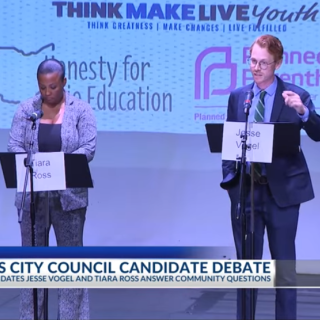This article first appeared on Ohio Capitol Journal
In August 2023, Ohio voters sent a clear message when they overwhelmingly rejected the legislature’s blatant attempt to undermine our citizen-initiative process. But instead of listening, politicians in Columbus doubled down. Their new targets? Everyday Ohioans who dare to collect signatures, knock on doors, and exercise their constitutional right to direct democracy.
Ohio Senate Bill 153 and Ohio House Bill 233 are the latest attempts to dismantle the people’s power. While headlines may focus on disingenuous provisions about voter registration and drop boxes, buried deep in these 204-page monstrosities are provisions specifically designed to intimidate, harass, and shut down grassroots campaigns before they ever reach the ballot.
Let’s be clear: these bills are an attack on the People’s Process — on your voice, your rights, your power.
Imagine a system where simply collecting signatures for a cause you believe in could land you under investigation, compelled to testify before hostile politicians without any evidence of wrongdoing. No formal charges, no protections — just suspicion, interrogation, and intimidation. Organizers could be forced to reveal private donor lists, volunteer contacts, and internal communications. This isn’t democracy. It’s surveillance. It’s coercion. It’s guilty until proven innocent.
And it gets worse.
These bills are packed with petty, punitive rules designed to trip up campaigns on technicalities. Didn’t write the number of signatures in a petition book personally? All signatures in that book: void. A minor correction to a signature count? Void. Wearing a “compensation badge” while volunteering—because you accepted a slice of pizza before canvassing? If not, void. This is death by a thousand cuts — and it’s exactly what the General Assembly wants. Why? Because when citizens write the laws, it threatens the political status quo. A status quo built and reinforced by rampant gerrymandering that leaves most Ohioans without a voice in the Statehouse.
Two constitutional amendment campaigns — one to end qualified immunity and another to eliminate property taxes — are preparing for signature collection. If these bills pass, both will face outrageous, politically motivated barriers. That’s not a bug in the legislation. It’s the design.
And what about the so-called “solutions” these bills claim to offer?
Requiring proof of citizenship to register to vote is a dangerous fix to a nonexistent problem. Just ask Kansas, where a similar law blocked over 30,000 eligible voters from registering — until a federal judge struck it down as unconstitutional. Claims of widespread non-citizen voting have been repeatedly debunked. Meanwhile, real people — like a longtime East Cleveland resident wrongly flagged as a non-citizen — pay the price.
As for drop boxes: these secure, monitored ballot return options helped over 180,000 Ohioans cast their vote in November 2024. We need more of them, not fewer. Restricting access only makes voting harder, not safer.
SB 153 and HB 233 would have chilling real-world consequences and set a dangerous precedent. Any lawmaker who says, “If you have nothing to hide, you have nothing to fear,” should take a long look in the mirror. That logic has no place in a democracy.
This isn’t about partisan politics. This is about power — and who gets to wield it. The answer must remain: the people.
--------------
Collin Marozzi serves as policy strategists for the ACLU of Ohio. Based out of the Columbus office, Collin works with coalition partners, community stakeholders, and elected officials to advance the ACLU’s agenda. Though always on the lookout for new advocacy opportunities, Collin is primarily focused on enacting criminal justice reforms, ensuring equal protection for the LGBTQ community, and expanding voting rights. Before joining the ACLU of Ohio in January of 2020, Collin spent over two years working in the Ohio Legislature, first as a Legislative Service Commission Fellow and then as senior legislative aide to Senator Vernon Sykes. Collin earned his BA in Political Science from Allegheny College in May of 2012. He then went on to pursue his graduate studies at the University of Akron where he received a Masters of Applied Politics from UA’s Bliss Institute. While studying at the Bliss Institute, Collin had the opportunity to intern with Common Cause Ohio and Senator Sherrod Brown’s office in Columbus.



